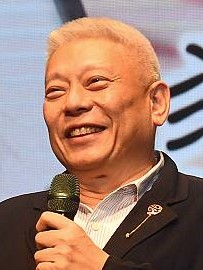Tsai Eng-meng
Tsai Eng-meng | |
|---|---|
 | |
| Born | 1957 (age 66–67) |
| Nationality | Taiwanese |
| Occupation | Businessman |
| Title | Chairman, Want Want China |
| Spouse | Married |
| Children | 2 sons |
Tsai Eng-meng (Chinese: 蔡衍明; pinyin: Cài Yǎnmíng; born 1957) is a Taiwanese businessman, chairman of the snack food company Want Want China.[2] In 2017 he was the richest person in Taiwan.[3]
Early life
Tsai was born in 1957,[4] in Datong District, Taipei, the son of Tsai A-Shi, who founded a canned fish business in 1962.[5]
Career
Tsai succeeded his father as chairman of Want Want in 1987.[4]
According to Forbes, Tsai Eng-meng has a net worth of $5.9 billion, as of January 2017.[1]
For a non-politician, he has been extremely active politically. He strongly supports the unification of Taiwan and China.[6] In 2012 he said that "unification will happen sooner or later."[7]
Personal life
He lives in Shanghai, China.[1] His older son, Kevin Tsai runs the family's media empire of TV stations and newspapers.[5] His younger son Matthew Tsai (Tsai Wang-Chia, born 1984) is the chief operating officer of Want Want China.[4] He is a follower of Buddhism.[8]
References
- ^ a b c "Forbes profile: Tsai Eng-Meng". Forbes. Retrieved 29 August 2020.
- ^ "Archived copy". Archived from the original on 18 January 2015. Retrieved 17 January 2015.
{{cite web}}: CS1 maint: archived copy as title (link) - ^ "Want Want's Tsai ranks as richest man in Taiwan | Economics | FOCUS TAIWAN - CNA ENGLISH NEWS". Focustaiwan.tw. Retrieved 23 January 2017.
- ^ a b c "中国旺旺 - 中国旺旺". Want-want.com. 1 March 2015. Retrieved 23 January 2017.
- ^ a b "Billionaire's Media Push Tests The Toughness Of A Taiwan "Strawberry"". Forbes.com. Retrieved 23 January 2017.
- ^ Aspinwall, Nick. "Taiwan Shaken by Concerns Over Chinese Influence in Media, Press Freedom". thediplomat.com. The Diplomat. Retrieved 26 July 2019.
- ^ Higgins, Andrew. "Tycoon prods Taiwan closer to China". www.washingtonpost.com. The Washington Post. Retrieved 26 July 2019.
- ^ Lee, Minerva (4 June 2017). "10 Buddhist Billionaires in Asia".
